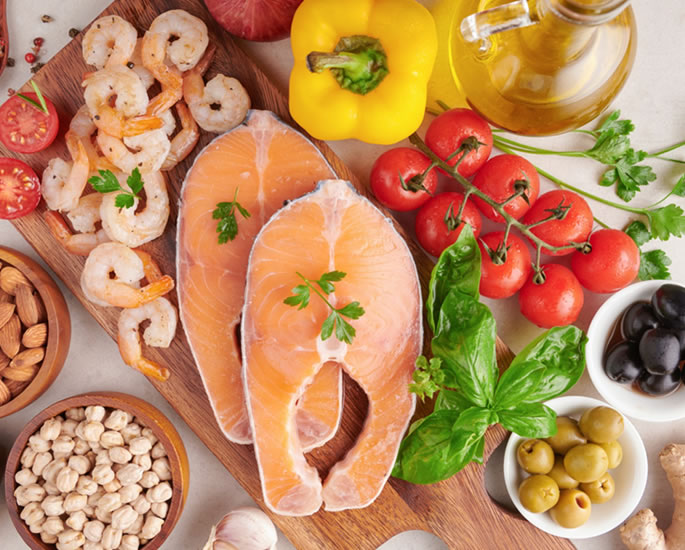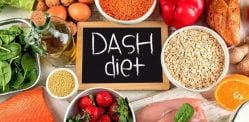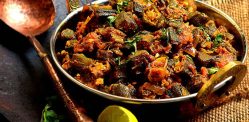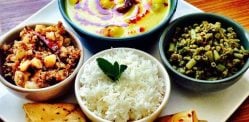"associated with numerous health benefits"
The Mediterranean Diet has quickly become a trend among people looking to eat more healthily.
While the diet has evolved over time and varies by region, its roots can be traced back to ancient times.
The term was first coined in the 1950s by American nutritionist Ancel Keys, who found that people in Mediterranean countries had lower rates of heart disease and other chronic illnesses compared to people in other parts of the world.
Because the diet has a focus towards vegetables, Indian cuisine can be incorporated into it due to the vast array of vegetarian dishes.
The Mediterranean Diet emphasises whole grains and pulses, two things that are prominent within Indian cuisine.
We explore the Mediterranean Diet and highlight some of the Indian foods that can be eaten as part of this diet.
What is the Mediterranean Diet?

The Mediterranean Diet is a way of eating that emphasises whole, plant-based foods and lean protein sources, with a focus on foods that are traditionally consumed in countries bordering the Mediterranean Sea.
The diet is high in fruits, vegetables, whole grains, legumes, nuts and seeds.
It also encourages the consumption of healthy fats like olive oil and fatty fish like salmon.
The Mediterranean Diet also limits the intake of red meat, processed foods and added sugars, and encourages the use of herbs and spices instead of salt to flavour foods.
Numerous studies have shown that following a Mediterranean Diet can have a wide range of health benefits, including reduced risk of heart disease, stroke and certain types of cancer, as well as improved brain function and longevity.
Eleni Melliou and Prokopios Magiatis, researchers at the University of Athens, said:
“Overall, the Mediterranean Diet is characterised by a high intake of plant-based foods, including fruits, vegetables, whole grains, legumes, and nuts, along with moderate consumption of fish, dairy, and red wine, and limited intake of red meat, processed foods, and sugar-sweetened beverages.
“This dietary pattern has been associated with numerous health benefits, including lower risk of cardiovascular disease, diabetes, certain cancers, and overall mortality.”
Health Benefits
The Mediterranean Diet has been shown to have numerous health benefits. This includes:
Reduced risk of heart disease
It emphasises foods that are rich in healthy fats like olive oil and nuts, as well as whole grains, fruits and vegetables, which have been linked to a reduced risk of heart disease.
Not only does it reduce bad LDL cholesterol but it also lowers blood pressure, two risk factors of heart disease.
Lower risk of stroke
Studies have shown that the Mediterranean Diet can lower the risk of stroke.
This is partially due to its emphasis on whole grains, fruits, and vegetables, which are rich in fibre, vitamins and minerals.
Improved brain function
The Mediterranean Diet has been associated with improved cognitive function and a reduced risk of cognitive decline in older adults.
Lowered risk of certain cancers
Studies have found that the Mediterranean Diet may help reduce the risk of certain types of cancer, including breast and colorectal cancer.
Improved longevity
The Mediterranean Diet has been linked to a longer lifespan and a lower risk of age-related diseases.
Better weight management
It may not be a weight loss diet but it can help with weight management.
This is because it emphasises nutrient-dense, filling foods that can help you feel satisfied and prevent overeating.
Indian Food & The Mediterranean Diet

You can adopt the Mediterranean Diet with Indian food because not only is it nutritionally balanced and diverse, but it also has varied flavours and textures.
It does not restrict calories, fat or sodium. Instead, it highlights what you eat.
Between five and 10 servings of fruit and vegetables should be eaten during each meal. These can be eaten raw, grilled, steamed, sautéed, roasted or pickled.
Given that there are plenty of vegetarian options in Indian cuisine, it should not be difficult.
Some Indian dishes to consider include chole, aloo gobi and daal.
Eating fruit helps to curb the sugar cravings, which are normally observed at midday or after dinner.
Complex whole grains are packed with fibre and antioxidants.
They also help lower mortality rates linked to cardiovascular disease and type 2 diabetes, two health issues that are common among South Asian people.
Consume whole grains such as brown rice, quinoa and millets such as bajra and ragi. Both of these millets can be used to make roti.
So for those observing the Mediterranean Diet, swap whole wheat flour for a healthier millet.
Because the Mediterranean Diet is moderately high in protein, daal and Omega 3-rich fish dishes are ideal Indian meals to eat.

Fish like salmon, tuna and herring are rich in Omega 3. Eat this at least twice a week.
Include milk, curd and yoghurt to encourage the growth of healthy microbes.
Kadhi and raita are just two meal accompaniments that will fill the yoghurt void.
To experience the best of the Mediterranean Diet, include a protein source in every meal.
When cooking, use olive oil instead of ghee because the former is high in healthy monounsaturated fats. Although olive oil is the primary healthy fat, the use of canola, peanut and safflower oil is also encouraged.
But do not use more than four teaspoons in a day.
Indian cuisine is typically made with an array of herbs and spices, something that is key in a Mediterranean Diet.
Not only does it enhance the flavour but it also helps to reduce the need for salt.
Salt reduction automatically controls the blood pressure issue and reduces water retention in the body.
These Indian foods should be eaten alongside water.
Drinking approximately two litres of water a day detoxifies the body. It keeps the body hydrated, aids digestion and improves blood circulation.
Red wine is a controversial topic due to the effects of alcohol.
But a study published in Clinical Nutrition found that red wine increases good (HDL) cholesterol. On the flip side, non-alcoholic red wine decreases levels of bad (LDL) cholesterol.
Red wine also contains antioxidants, which can improve cholesterol and help you maintain a healthy blood pressure.
If you want to replace red wine, it is best to opt for freshly prepared unsweetened black grape juice.
A Diet Plan

Here is a diet plan incorporating Indian food into the Mediterranean Diet.
Breakfast
An omelette using two egg whites and chopped bell pepper.
Alternatively, you can have one cup of daliya pulao with lots of carrots and bell peppers, along with one cup of milk.
Mid-Morning
Between 100 and 150 grams of any red, yellow or green-coloured fruit.
Lunch
One cup of salad consisting of diced carrots, green and red bell peppers, broccoli and shredded red cabbage.
Alternatively, make one cup of brown rice packed with vegetables.
Another Indian option is to make one cup of daal or 100g of fish. A leafy green vegetable dish is another option.
Eat with two to three rotis that have been made with multigrain flour.
Snacks
Two to four walnut halves, a piece of fruit and a cup of green tea.
Dinner
Dinner can be the same food options as lunch but alternate to prevent mealtimes from becoming tedious.
Undertaking the Mediterranean Diet is not only delicious, but it can also help you reduce your risk of developing chronic diseases such as heart disease and cancer.
Because it is focused on high amounts of fruits, vegetables, whole grains and pulses, as well as moderate amounts of fish and poultry, it pairs well with Indian food.
But to make the most out of this diet, it is important to take part in regular exercise as well.






























































